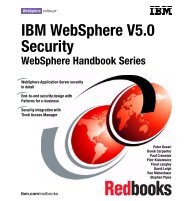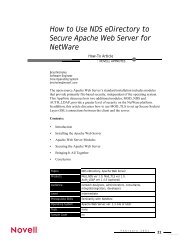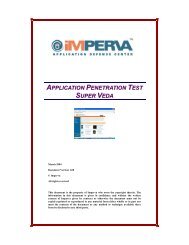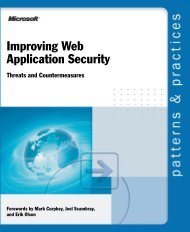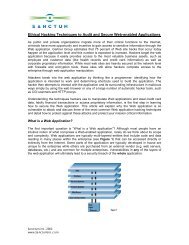J2ee and .Net security, (PDF) - CGISecurity
J2ee and .Net security, (PDF) - CGISecurity
J2ee and .Net security, (PDF) - CGISecurity
You also want an ePaper? Increase the reach of your titles
YUMPU automatically turns print PDFs into web optimized ePapers that Google loves.
Both platforms use similar concepts for h<strong>and</strong>ling user <strong>and</strong> code access to resources, with<br />
permissions being key to both, <strong>and</strong> the concept of roles being used to associate permissions with<br />
prinicipals in both environments.<br />
While J2EE uses the concept of Organisational Roles to delineate responsibilities at various<br />
stages of the development <strong>and</strong> deployment process, .<strong>Net</strong> does not define the hierarchy as<br />
clearly.<br />
While .<strong>Net</strong> provides a solid <strong>security</strong> model through managed code in the CLR, the ability to run<br />
unmanaged code confers the ability to bypass CLR <strong>security</strong> through direct calls to the underlying<br />
OS APIs. In the Java world, signed, trusted code has unrestricted access to system resources.<br />
Java calling out to native (C/C++) code through JNI confers the ability to bypass the JRE’s<br />
<strong>security</strong> as surely as running unmanaged code in the CLR can be used to bypass.<strong>Net</strong>’s <strong>security</strong>.<br />
The reliance on Microsoft-specific identification stores such as Passport or Windows domains for<br />
authentication <strong>and</strong> authorisation purposes means that .<strong>Net</strong> applications may require end-users to<br />
subscribe to Microsoft’s Passport service. As an example of why this might be a “bad thing”,<br />
Microsoft had to temporarily shut down part of its Passport service during November 2001 due to<br />
a <strong>security</strong> issue. Current copyright restrictions prevent non-Microsoft vendors from providing<br />
alternatives, forcing .NET application developers to rely upon a single vendor for back-end<br />
services. Concern at this stance in the wider developer <strong>and</strong> Internet communities has resulted in<br />
projects like DotGNU <strong>and</strong> Project Liberty. DotGNU is an FSF (Free Software Foundation)<br />
initiative to provide an open-source implementation of the .<strong>Net</strong> framework, <strong>and</strong> a non-vendor<br />
controlled Passport alternative (Virtual Identities), which is intended to use encryption wherever<br />
possible to protect user details. Project Liberty is an alliance whose members include Sun, AOL,<br />
Vodafone, American Express, HP <strong>and</strong> RSA, to name but a few, with the stated aim of creating a<br />
federated single-sign-on scheme allowing authentication <strong>and</strong> authorisation from any type of<br />
network connected device.<br />
Java has also had its share of <strong>security</strong> problems in the past, especially in the area of certain<br />
JREs <strong>and</strong> malicious applets; problems have also been reported in the class loading process, a<br />
fundamental part of JVM <strong>security</strong>, as described above.<br />
One of the crucial challenges for both Microsoft <strong>and</strong> J2EE vendors when developing their<br />
respective platforms is securely h<strong>and</strong>ling code obtained from multiple sources, outside of the<br />
local machine. The code verification functions of the JVM are quite mature at this stage <strong>and</strong><br />
mistakes made in the past have been learned from. The CLR model is similar, but the<br />
implementation is relatively untested. It will be interesting to see how the .<strong>Net</strong> environment<br />
st<strong>and</strong>s the test of time from a <strong>security</strong> perspective, once .<strong>Net</strong> deployments become more<br />
widespread.



